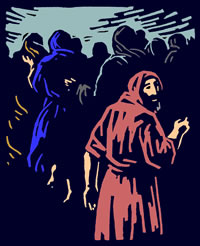
28th Sunday in Ordinary Time Year C
Today’s gospel reading follows immediately after last Sunday’s reading. This linkage is important, because it helps us appreciate Luke’s presentation of this incident, as expanding the teaching on ‘faith’ in last Sunday’s gospel. The miracles of Jesus were, before all else, signs pointing to what was to be expected from the Saviour’s presence among us. In this miracle, the interaction between Jesus and the Samaritan who returns to give thanks leads us deeper into an understanding of the faith that is God’s gift.
Jesus tells the Samaritan that it is ‘faith’ that has saved him. His companions, too, we may presume, also had faith – evidenced in their common plea with him, and the fact that they too have been healed - because Jesus is surprised that they have not returned. But, unlike the one who returns, they do not have the gratitude that is the expression of a lively faith. If faith is a trusting readiness to receive the great things God does for us, it is also a grateful recognition of what God has done and is doing in our lives. The Samaritan helps us understand what this awareness involves. He ‘turned back praising God at the top of his voice’. Our relationship with our God is quite unique; the other relationships that shape our lives cannot be compared with it. Our awareness of our indebtedness to God should deepen more and more this unique relationship, as we grow in wonder at the blessings of each day. It is not by chance that we call our principal act of worship, our ‘Eucharist’, our ‘Thanksgiving’.
Shouting his praises, the healed man ‘throws himself at the feet of Jesus’. His faith is a readiness to received what only God can give; but he recognises that it is through Jesus that God’s blessing comes to him – through the one whose teaching and ministry led him and his desperate companions to appeal to the ‘pity’ they recognised in Jesus; through the one whose authoritative word they accepted immediately, not yet healed, but ready to do what he commanded. The whole sequence presents Jesus as the Saviour. He sends the band to ‘show themselves to the priests’ – in accordance with the accepted custom: that the authority to allow those with contagious diseases rejoin the community was given by Israel’s Law to the priests. Now, in the case of the Samaritan, Jesus himself assumes this authority, ‘Go on your way!’
The gift of God given by God to those who have faith is universal – it excludes nobody. It is not surprising that Luke, the Gentile convert, is especially conscious of this. His care to include reference in his writings to the Samaritans – the renegade group, hated by the Jews as half-pagan – reflects this awareness, pointing to the conversions that were to be so important in the first Christian communities. He alone brings us the story of the Good Samaritan; he devotes a chapter (ch 8) of the Acts of the Apostles to the preaching of the gospel to the Samaritans; and now he alone holds up this Samaritan as an example of lively faith.
John Thornhill sm

